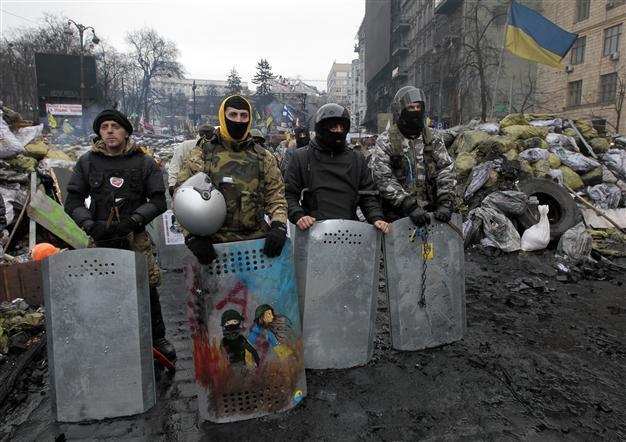Three protesters dead, 150 injured in Kiev: Ukraine's opposition
KIEV - Agence France-Presse

Anti-government activists guard the barricade in central Kiev, Ukraine, Sunday, Feb. 16, 2014. AP Photo
At least three anti-government protesters were killed and around 150 others were injured, some seriously, in fresh clashes between police and demonstrators in Kiev on Feb. 18, opposition medics said."At least three people have died. All of them had gunshot wounds," said Oleg Musiy, head of a medical team that runs first-aid centres for protesters. Another medic at the opposition-run field hospital told AFP that most of the injuries were caused by stun grenades.
Thirty people were in a serious condition, and some had suffered head injuries, he said. One person had to have a hand amputated.
Police said 47 security officers had been hurt in the clashes, with five sustaining bullet wounds.
Demonstrations against the rule of President Viktor Yanukovych descended into violence on Feb. 18 for the first time in weeks as protesters fought pitched battles with security forces in the area around Ukraine's Parliament building.
Demonstrators turned their ire on Yanukovych's party after clashes broke out with riot police around the nearby building of the Ukrainian parliament, where some 20,000 mainly peaceful protesters had massed to demand legislators strip the president of a raft of powers.
Protesters were calling on the Rada parliament -- where Yanukovych's party has a majority -- to vote on returning the country to its 2004 constitution, under which key powers would shift from the president to parliament.
They had marched from Kiev's iconic Independence Square, where the opposition remains firmly entrenched in a sprawling tent city after nearly three months of protests against Yanukovych's rule.
Opposition leaders called on Yanukovych to give into their demands if he wanted to defuse the violence.
"The president of Ukraine must call early presidential and parliamentary elections. I am sure that this will reduce the temperature of society," former heavyweight boxer and opposition leader Vitali Klitschko said in televised comments.
"Do this, and this will be a way out. This will be a courageous step," Klitschko said.
The U.S. ambassador on Twitter lamented the resumption of violence. "After weekend progress in Kyiv, sorry to see renewed violence," envoy Geoffrey Pyatt wrote. "Politics needs to happen in the Rada, not on the street."
Klitschko-Merkel talks
Before the latest outbreak of violence on Feb. 18 Ukraine appeared to be inching towards resolving its worst post-Soviet crisis that was sparked by Yanukovych's decision in November to reject an EU pact years in the making.
The pro-EU, anti-government protests have since snowballed into a titanic tug of war for Ukraine's future between Russia and the West.
On Feb. 17 the government granted an amnesty to those arrested in the protests after the opposition vacated Kiev's city hall and other administrative buildings it had been occupying.
Also on Feb. 17, Klitschko held talks in Berlin with German Chancellor Angela Merkel, urging her to slap sanctions on Yanukovych and his financial backers in a bid to ratchet up pressure on the embattled leader.
During the meeting, which was also attended by opposition leader Arseniy Yatsenyuk, Klitschko asked Merkel for "financial assistance to overcome the crisis" in the beleaguered nation.
The talks in Berlin came as Russia's Finance Minister Anton Siluanov vowed to release "this week" a $2 billion tranche of a $15 billion bailout package to Ukraine that Moscow had essentially frozen after the protests turned deadly last month.
So far only $3 billion of the bailout has been transferred to Ukraine's economy, which is struggling to recover from a recession and is being badly hit by capital flight and currency devaluation during its prolonged crisis.
In a concession to the protesters, Yanukovych has dismissed his unpopular government, but he has yet to appoint a new one and the opposition wants its members to be placed in key positions.
















